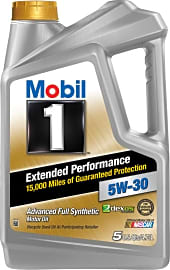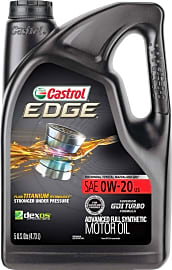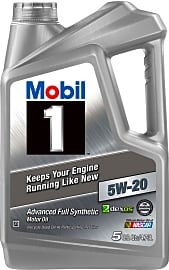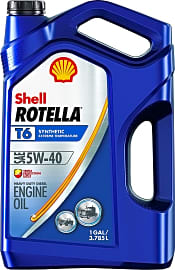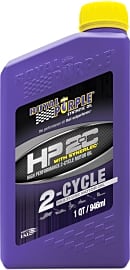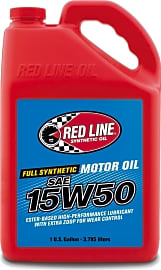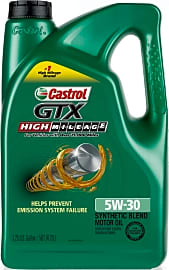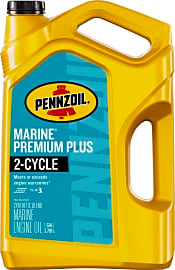The 10 Best Synthetic Oils

This wiki has been updated 40 times since it was first published in June of 2015. Synthetic oil provides superior protection and lubrication to engines than the conventional kind. Most formulas for gasoline vehicles are almost identical, and on this list are the best consumer blends that meet the latest standards. For specific applications, such as diesels, dirt bikes, and drag racing, though, you'll want to be completely certain you've selected the right variety. When users buy our independently chosen editorial picks, we may earn commissions to help fund the Wiki.
Editor's Notes
February 11, 2021:
You'll notice there is little change in our synthetic oil recommendations from year to year and there is a good reason for this. There are a handful of companies that dominate the market, and though they may redesign their packaging from time to time, the contents inside of those bottles doesn't change much from year to year. Sure, there are sometimes advances that allow for better stability, resistance to viscosity breakdown, and less oxidation or buildup of deposits, however that certainly doesn't happen on a annual basis. That being said, as soon as we do see something new on the market that proves to perform better than one of our current recommendations, which includes 2-cycle, marine, and even racing varieties, we will be sure to quickly update our choices.
July 05, 2019:
Having some experience repairing engines can give you good insight about how engine oils perform in the long-term - particularly if you're responsible for the maintenance across that period of time. Full synthetic motor oil is, without a doubt, better than conventional oil for most applications and across most metrics of protection.
Mobil 1 and Castrol EDGE were added to this list to account for updates in lubrication technology and modern engine requirements. Mobil 1 is a staple that has a proven performance track record and should be included in any conversation about the best motor oil. Castrol EDGE is gaining a dedicated following because of its innovations and because it meets the stringent Dexos requirements set by GM for its new engines. On average, these engines have quite a bit longer between scheduled maintenance precisely because of this Dexos requirement, along with redesigned engines. You can expect about 7-8,000 miles between oil changes whereas on most commercial engines, it was standard to replace the oil every 3,000 miles.
Engines are sensitive and complex systems with high pressures and hazardous fluids. All automotive and small engine repairs should be performed by trained technicians to avoid personal injury or damage to equipment.
Why Oil Is So Important
Internal combustion engines make use of thousands of controlled detonations every minute.
Oil is the lifeblood of an engine and without it, your engine would overheat, wear down, and destroy itself in a very short period of time. There are three vital functions oil performs inside of an engine to keep it running smoothly for years: lubrication, cooling, and removal of contaminants.
Inside on an engine are many moving metal parts that are operating thousands of an inch of each other. If (and when) these surfaces touch, they abrade each other, shaving off microscopic debris. Without thin molecules of oil separating the parts, lubricating them, and reducing friction, several things can happen. The metal parts may heat up and distort, causing them to bang together, causing further damage. Metal shavings from one may rub off onto another in a process called galling. The piston could even get stuck in the cylinder bore, causing the engine to freeze up. All of these things can lead to permanent engine failure.
Internal combustion engines make use of thousands of controlled detonations every minute. This creates the force needed to move the engine components and propel your car forward. These detonations can cause a significant buildup of heat. As oil travels through your engine, it draws heat away from the combustion chamber and allows it to dissipate in the oil pan. This helps to keep your engine from overheating.
As an engine runs, it creates contaminants. These can be bits of metal that result from wear on the metal parts or a buildup of carbon as a byproduct of the combustion. Motor oil not only carries these contaminants away as it travels though the system and deposits them in the oil filter, but it also contains a number of additives to prevent them. Common motor oils contain additives such as rust inhibitors, detergents, and dispersants.
What Is Synthetic Motor Oil And How Is It Made?
Synthetic oil is a lubricant that is used as a substitute for petroleum-refined oils. Unlike standard motor oils, it is not distilled from crude oil. Instead, it is made from materials like carbon dioxide, methane, and carbon monoxide through a chemical process known as the Fischer-Tropsch process. This results in a cleaner oil, which has more uniform hydrocarbon molecules. It also doesn't contain any of the unnecessary compounds found in crude-based oils, like paraffin wax. All of this makes synthetic oil better for extreme temperatures applications.
This special blend of oils results in a motor oil that does a better job of protecting an engine, as can be expected from full-synthetics, but at a lower cost.
There are two types of synthetic oil: full-synthetics and semi-synthetics. Full-synthetic oils can be derived from crude oil or from other chemical compounds. If it is derived from crude oil, it is done with the aforementioned Fischer-Tropsch process instead of the traditional distilling method. This results in an oil with more uniform properties that is better suited to the mechanical applications it is designed for.
Semi-synthetic oils are a combination of traditional mineral motor oils and synthetic oils. This special blend of oils results in a motor oil that does a better job of protecting an engine, as can be expected from full-synthetics, but at a lower cost. The first semi-synthetic motor oil was introduced in 1966 by Motul. They also released Century 300V, which was the first 100% synthetic lubricant created for cars.
Benefits Of Synthetic Motor Oil
Because synthetic motor oils are created rather than distilled, they can tailored to the demands of modern car engines. Customized oil molecules with less useless impurities results in a higher quality lubricant that easily out performs its mineral-based counterpart. Synthetic oil's ability to deal with the extreme conditions encountered in internal combustion engines shows itself in a number of ways. It is easier to pump at low temperatures, which is extremely important as this means it can fully circulate through an engine quicker on startup. The quicker an oil circulates through an engine when started, the less time the internal components are moving without lubrication. This equates to less engine wear and a longer engine life.
It is easier to pump at low temperatures, which is extremely important as this means it can fully circulate through an engine quicker on startup.
In addition to performing better when an engine is first started, they also perform better at higher temperatures because they are less volatile. Fluctuating temperatures have less effect on a synthetic oil's viscosity as they do on mineral-based oils.
Synthetic oils have less impurities than standard motor oil, which forms large amounts of sludge as it breaks down. This sludge decreases an engine's efficiency. With less impurities and a consistent molecular structure, synthetic oil can better resist oxidation and will produce fewer deposits.
If you are an eco-friendly consumer, you'll appreciate that synthetic oils are better for the environment. Unlike traditional motor oils, they don't need to be drained and recycled every 3,000 miles. Instead, they are designed to be changed anywhere from 7,000 to 15,000 miles, depending on the oil. This is better for the environment, and will save you from running to the mechanic every couple of months.


